人教版英语五年级上册-unit6知识点及练习
PEP人教版五年级上英语Unit6知识点、考点梳理精编
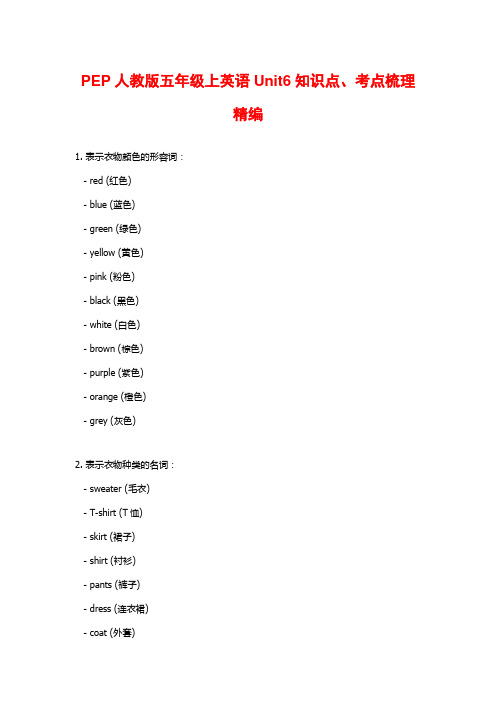
PEP人教版五年级上英语Unit6知识点、考点梳理精编1. 表示衣物颜色的形容词:- red (红色)- blue (蓝色)- green (绿色)- yellow (黄色)- pink (粉色)- black (黑色)- white (白色)- brown (棕色)- purple (紫色)- orange (橙色)- grey (灰色)2. 表示衣物种类的名词:- sweater (毛衣)- T-shirt (T恤)- skirt (裙子)- shirt (衬衫)- pants (裤子)- dress (连衣裙)- coat (外套)- jacket (夹克)- jeans (牛仔裤)3. 表示衣物穿着方式的动词短语: - put on (穿上)- take off (脱下)- wear (穿戴)4. 询问衣物颜色的句型:- What color is your sweater? - What color are your pants?5. 回答关于衣物颜色的句型:- It's red.- They're blue.6. 穿着衣物的句型:- I'm wearing a blue shirt.- She's wearing a pink dress. - He's wearing black pants.7. 表示时间的词汇:- morning (早上)- afternoon (下午)- evening (晚上)- night (夜晚)8. 表示星期的词汇:- Monday (星期一)- Tuesday (星期二)- Wednesday (星期三)- Thursday (星期四)- Friday (星期五)- Saturday (星期六)- Sunday (星期日)9. 介绍日常活动的句型:- What do you do in the morning/afternoon/evening?- I usually play sports in the afternoon.10. 询问他人日常活动的句型:- What does she/he do in the morning/afternoon/evening? - She/He usually watches TV in the evening.11. 表示日常活动的动词:- get up (起床)- have breakfast/lunch/dinner (吃早餐/午餐/晚餐)- go to school/park (去学校/公园)- do homework (做作业)- play sports/games (进行运动/玩游戏)- watch TV (看电视)- read books (读书)- go to bed (上床睡觉)12. 特殊疑问词how long:- How long does it take to get to school? (从家到学校需要多长时间?) - It takes about 15 minutes. (大约需要15分钟)。
人教版PEP英语五年级上册Unit 6 讲解

人教版PEP英语五年级上册Unit 6 讲解一、核心词汇1. 表示自然界事物的名词:forest森林;林区 river河;江 lake湖;湖泊mountain高山;山岳 hill山丘;小山tree树;树木;乔木2. 表示建筑类名词:bridge桥 building建筑物;房子;楼房village村庄;村镇house房屋;房子;住宅二、了解词汇1. 单词:boating划船 rabbit兔;野兔 high高的2.短语:go boating去划船 a ren’t=are not三、核心句型1. — Is there a river in the forest, Miss white? 怀特老师,森林里有河吗? — No, there isn’t.不,森林里没有河。
解读: 这是there be句型单数形式的一般疑问句, is there后加可数名词单数形式。
2. — Are there any lakes in the park?公园里有湖吗?— Yes, there are.是的,公园里有湖。
解读: 这是there be句型复数形式的一般疑问句,可以用来询问某处是否有某人或某物。
are there后面跟可数名词复数形式。
拓展: some和any都表示一些, some一般用在肯定句中, any用在疑问句和否定句中。
3. What a nice day!天气真好啊!解读:这是一个感叹句。
感叹句是表示人惊讶、恐惧、忧伤、愉快等感情的句子。
拓展: how引导的感叹句。
句型结构为“How+形容词/副词(+主语+谓语)!”4. Why not?为什么不呢?解读:这是日常生活中常用的口语,用来表示对对方提出建议的赞同。
四、了解句型1. Let’s go boating.我们去划船吧。
2. How many?有多少个?3. There is so much corn!里边有那么多玉米!解读: many和much都可以表示很多, many用来修饰可数名词的复数形式。
英语总复习五年级上册重点unit6
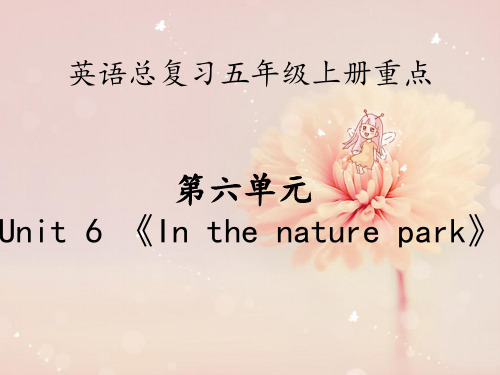
-----Are there m__a_n_y tall _b_u_il_d_i_ngins the city? -----Yes,_t_h_e_re_ _a_re_. 5.让我们去自然公园吧! Let’s go to the _n_a_tu_r_e_ _p_a_rk_!
五、按要求写句子。 1.Mr Carter is our new English teacher.(对划线部分提问)
_W__h_o_i_s_y_o_u_r_n_e_w__E_n_g_l_is_h__te_a_c_h_e_r?__ 2.He is short and strong.(对划线部分提问)
英语总复习五年级上册重点
第六单元 Unit 6 《In the nature park》
重点单词 forest森林 hill山丘,小山 river河;江 mountain 高山,山岳 lake 湖;湖泊 bridge 桥 village 村庄,村镇 house 房屋,房子,住宅 tree 树,树木 go boating 去划船 nature park 自然公园 people 人,人们 rabbit 兔子 duck 鸭子 animal 动物 high 高的 children 孩子们(child的复数形式) 重点句子 1. Children, let’s go to the forest. 孩子们,让我们去森林吧。 2. Is there a river in the forest? 森林里有条河吗? —Yes, there is. --—No, there isn’t 3. The nature park is so quiet! 自然公园这么安静!
[PEP人教版五年级上英语Unit,6知识点、考点梳理精编]五年级上册英语unit6
![[PEP人教版五年级上英语Unit,6知识点、考点梳理精编]五年级上册英语unit6](https://img.taocdn.com/s3/m/629d8e317f1922791788e86a.png)
[PEP人教版五年级上英语Unit,6知识点、考点梳理精编]五年级上册英语unit6Unit6In a nature park 一、核心词汇 1. 表示自然界事物的名词: forest森林;林区river河;江lake湖;湖泊mountain高山;山岳hill山丘;小山tree树;树木;乔木2. 表示建筑类名词: bridge桥building建筑物;房子;楼房village村庄;村镇house房屋;房子;住宅二、了解词汇 1. 单词: boating划船rabbit兔;野兔high高的2.短语: go boating去划船aren’t=are n ot 三、核心句型 1. —Is there a river in the forest, Miss white? 怀特老师,森林里有河吗? — No, there isn’t.不,森林里没有河。
解读: 这是there be句型单数形式的一般疑问句, is there后加可数名词单数形式。
2. —Are there any lakes in the park? 公园里有湖吗? —Yes, there are.是的,公园里有湖。
解读: 这是there be句型复数形式的一般疑问句,可以用来询问某处是否有某人或某物。
are there后面跟可数名词复数形式。
拓展: some和any都表示一些, some一般用在肯定句中, any用在疑问句和否定句中。
3. What a nice day!天气真好啊! 解读:这是一个感叹句。
感叹句是表示人惊讶、恐惧、忧伤、愉快等感情的句子。
拓展: how引导的感叹句。
句型结构为“How+形容词/副词(+主语+谓语)!” 4. Why not?为什么不呢? 解读:这是日常生活中常用的口语,用来表示对对方提出建议的赞同。
四、了解句型 1. Let’s go boating.我们去划船吧。
2. How many?有多少个?3. There is so much water! 里边有那么多水! 解读: many和much都可以表示很多, many用来修饰可数名词的复数形式。
人教版五年级上册英语unit6考点解析
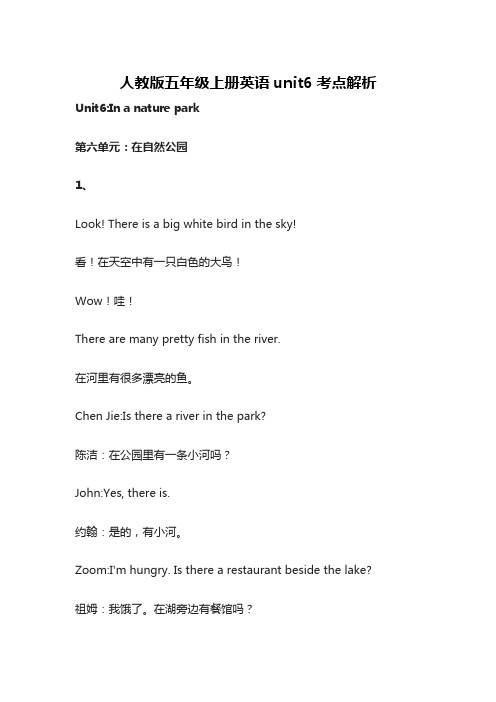
人教版五年级上册英语unit6考点解析Unit6:In a nature park第六单元:在自然公园1、Look! There is a big white bird in the sky!看!在天空中有一只白色的大鸟!Wow!哇!There are many pretty fish in the river.在河里有很多漂亮的鱼。
Chen Jie:Is there a river in the park?陈洁:在公园里有一条小河吗?John:Yes, there is.约翰:是的,有小河。
Zoom:I'm hungry. Is there a restaurant beside the lake?祖姆:我饿了。
在湖旁边有餐馆吗?Zip:No, there isn't.Look! I have some food. Let's share.吉普:不,没有,看!我有一些食物。
我们一起分享。
2、Let's try让我们试试What is in the park? Listen and tick the word you hear. 公园里有什么?听并在你听到的单词前打对勾。
(V)forest森林()lake湖()river小河3、Let's talk让我们谈谈Miss White: Children, let's go to the forest!怀特小姐:孩子们,让我们去森林!Children: Yeah!孩子们:耶!Zhang Peng: Is there a river in the forest,Miss White?张鹏:怀特小姐,森林里有一条河吗?Miss White: No, there isn't.怀特小姐:不,没有河。
Zhang Peng: Is there a lake, Miss White?张鹏:怀特小姐,那有湖吗?Miss White: Yes, there is and there are some small boats.怀特小姐:是的,有湖并且还有一些小船。
五年级上册英语Unit6知识点

Unit6 知识点一、单词:(要求会读、会背、会默)1.网友e-friend2.发出send3.电子邮件emai4.给to5.居住live6.英国UK7.学习study 8.澳大利亚Australia 9.加拿大Canada 10.中国China 11.美国US12.明天tomorrow 13.钓鱼fishing 14.坐sit 15.在……旁边by 16.等待wait二、词组:(要求会读、会背、会默)1.我的网友my e-friend2.去踢足球go and play football3.在操场上in the playground4.等一下。
Wait a minute.5.发一封电子邮件send an email6.居住在英国live in the UK7.居住在中国live in China8.居住在常州live in Changzhou9.你的网友your e-friend 10.发送一封电子邮件给彼特send an email to Peter 11.写一封电子邮件write an email 12.几岁how old 13.十一岁eleven years old 15.放学后after school 16.中文课Chinese lessons 18.一节英语课an English lesson 19.什么学科what subjects 20.喜欢游泳like swimming 21.喜欢数学和体育like Maths and PE 22.喜欢踢足球like playing football 23.在学校at school 25.游泳游得好swim well 26.去钓鱼go fishing 28.别担心。
Don’t worry. 29.擅长钓鱼be good at fishing 30.坐在河边sit by the river 31.有许多鱼have many fish 32.教他/她teach him/her 33.教你/我/我们teach you/me/us 34.吃苹果eat apples 35.吃一个桔子eat an orange 36.擅长英语be good at English 38.穿暖和的衣服wear warm clothes 39.做衣服make clothes 40.像这样like this 41.英文地址English addresses 42.写中文地址write Chinese addresses 43.上语文课have Chinese lessons 44.上一节语文课have a Chinese lesson 45.你对了。
人教版五年级上册英语第6单元Chores知识清单及测试

Unit 6 chores基础知识测试一、单词家务打扫房间整理床铺倒垃圾洗衣服清理书桌扫地打电话给二、句子1.Andy 你在家帮你的父母做家务吗??2.是的,我倒垃圾,整理床铺。
.3.我经常洗衣服。
.4.你通常在家里做什么??5.你多久做一次()家务??6.一周三次。
.7.你能和我一起玩吗??8.对不起,现在不行,我正在做家务。
.9.你经常在家做家务吗??10.是的,我经常浇花,我也喜欢喂鱼,我正在扫地。
.11.我经常整理我的数座,打扫我的房间。
.12.你喜欢做家务吗??13.是的,我喜欢帮我父母。
.14.有空的时候打电话给我。
.15.Susan在周日的时候总是很忙。
.16.晚饭前,Susan喂他的宠物。
.17.晚饭后,她经常倒垃圾。
.18.她经常洗衣服。
.19.机器人正在走进我们的生活。
.20.他们变得越来越有用处。
.21.例如,当生病的人不能走时,机器人可以拿吃的和喝的给他们。
.22.机器人也可以鼓励生病的孩子。
.23.很多人用机器人做家务。
.24.一些机器人能够学习了解你的家。
他们知道如何打扫地板,如何为你做饭。
.25.100年以后,机器人将能够做全部的家务。
.Unit 6 Chores基础知识清单一、单词家务chore 打扫房间clean the room 整理床铺make the bed 倒垃圾take out of the rubbish 洗衣服wash clothes 清理书桌tidy the desk 扫地sweep the floor 打电话给call二、句子26.Andy 你在家帮你的父母做家务吗?Do you help your parents do chores at home, Andy?27.是的,我倒垃圾,整理床铺。
Yes, I do. I take out the rubbish and make my bed.28.我经常洗衣服。
I usually wash clothes.29.你通常在家里做什么?What do you usually do at home?30.你多久做一次()家务?How often do you do it?31.一周三次。
人教新起点英语五年级上册Unit6知识点汇总

新起点(一起)五年级上册Unit6 知识汇总一、语音知识ch /tʃ/eg: choose,chair,China,Chinese,choice,cheesetch /tʃ/eg: catch,pitch,match,watchsh /ʃ/eg: fish, shine, show, shop, dish, wish,push,bush二、词汇chore家务clean theroom 打扫房间makethe bed 整理床铺takeout the rubbish 倒垃圾wash clothes 洗衣服tdy thedesk 清理书桌sweep the floor扫地call 打电话给.....三、句子1.-- Do you usually help your parents do chores at home?(你经常帮你父母在家做家务吗?)--Yes,I do. I take out the rubbish and make my bed.(是的,经常我倒垃圾和整理床铺。
)2.-What chores do you usually do at home?(你经常在家做什么家务?) --I usually wash clothes.(我通常洗衣服。
)--How often do you do it?(你多久洗一次衣服?)-- Three times a week.(一周三次。
)3.Ialso enjoy feeding my fish.(我也喜欢喂鱼。
4.Call me when you're free.(你不忙时打电话给我。
)5.Susan is always busy on Sunday.(苏珊在星期天总是很忙。
)四、句型结构1—What chores do you usually do at home?(你通常在家做什么家务?)--I usually+动词原形+其他eg:1-- What chores do you usually do at home?(你通常在家做什么家务?)--I usually wash clothes.(我通常洗衣服。
【精选】人教pep五年级上册英语第六单元Unit6《In a nature park》重要知识点总结

【精选】人教pep版五年级上册英语第六单元Unit6《In a nature park》重要知识点总结Unit6 In a nature park一、重点单词forest 森林,林区hill 山丘,小山river 河;江mountain 高山,山岳lake 湖;湖泊village 村庄,村镇house 房屋,房子,住宅tree 树,树木,乔木bridge 桥go boating 去划船nature park 自然公园people 人,人们rabbit 兔子duck 鸭子animal 动物high 高的children孩子们(child的复数形式)building 建筑物sky 天空cloud 云flower 花grass 草path 路;小道park 公园city 城市road 公路clean干净二、重点句子1. Children, let's go to the forest. 孩子们,让我们去森林吧。
2. —Is there a river in the forest? 森林里有河流吗?—Yes, there is. 是,有的。
/—No, there isn't. 不,没有。
3. The nature park is so quiet! 自然公园这么安静!4.There aren't many people. (这里)人不多。
5.—Are there any tall buildings in the nature park? 自然公园例有高楼吗?—Yes, there are. 是,有的。
/—No, there aren't.不,没有。
6.—How many? 多少?—Two.两个。
7.Robin is at Mr. Jones' house. 罗宾在琼斯先生的房子里。
8.—Where is the ball?球在哪里?—It's in beside/ behind/above/in front of the dog. 它在小狗的旁边/后面/上面/前面。
人教PEP版五年级英语上册Unit 6基础练习含答案

人教PEP版五年级英语上册Unit 6基础练习Unit 6自然公园一、重点语音。
选出每组单词的画线部分有几种读音。
( )1. mouse count flower ( )2. snow house should ( )3. mouth you around ( )4. sound our trousers 二、重点词汇。
(英汉互译)(一)自然景观及建筑类1. 桥2. 河; 江3. 湖; 湖泊4. 高山; 山岳5. 山丘; 小山6. 森林; 林区7. 村庄; 村镇8. 树; 树木; 乔木9. 建筑物; 房子; 楼房10. 房屋; 房子; 住宅(二)其他类1. high2. rabbit3. boating4. go boating5. a nature park6. in the forest7. on the mountain8. a high mountain三、重点句子。
(汉译英)(一)询问某处是否有某物及回答1. ——房子前面有一辆自行车吗?——是的, 房子前面有一辆自行车。
_________________________________________________________ _________________________________________________________ 2. ——森林里有河吗?——不, 森林里没有河。
_________________________________________________________ _________________________________________________________ 3. ——自然公园里有高楼吗?——不, 自然公园里没有高楼。
_________________________________________________________ _________________________________________________________ 4. ——公园里有湖泊吗?——是的, 公园里有湖泊。
Unit6必备知识(复习讲义)-五年级英语上册单元速记巧练(人教PEP版)

二、句子
1.—Is there a river in the forest, Miss White?
—No,there isn’t.
2.—Are there any tall buildings in the nature park?
7.there, the, a, nature, house, is, near, park (.)
_________________________________________________________
8.river, the, there, a, forest, is, in (?)
_________________________________________________________
3.Are there any ducks in the park.C.公园里有很多人。
4. There is a small river beside the forest.D.这幅画中有湖吗?
5.Are there any pictures in the picture?E.湖附近有很多高楼。
重点词句默写答案
12.去划船
13.兔;野兔
15.去划船
17.在公园里
19.在村庄附近
21.很多漂亮的鱼
23.去森林
25.在那边
27.在高山前
14.高的
16.自然公园
18.在湖边
20.在高山上
22.一些食物
24.看一看
26.在河里
28.一只白色的大鸟
二、句子
1.—怀特小姐,森林里有河吗?
五年级上册英语人教版(PEP)第六单元知识点
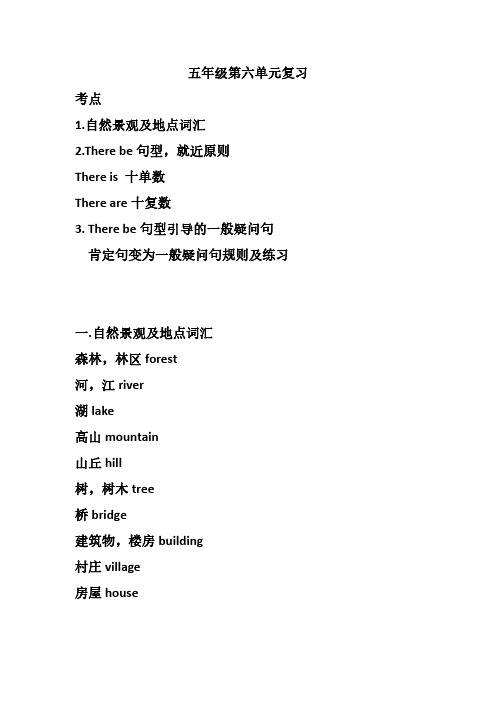
五年级第六单元复习考点1.自然景观及地点词汇2.There be句型,就近原则There is十单数There are十复数3.There be句型引导的一般疑问句肯定句变为一般疑问句规则及练习一.自然景观及地点词汇森林,林区forest河,江river湖lake高山mountain山丘hill树,树木tree桥bridge建筑物,楼房building村庄village房屋house二.There be句型,就近原则句型There is+a/an+物品(单数)+地点. There are+物品(复数)+地点.翻译:某处有某物1.桌子上有一台电脑。
There is a computer on the desk. 2.自然公园里有一座小山丘。
There is a hill in the nature park. 3.高山的后面有一个湖。
There is a lake behind the mountain.4.村庄里面有一些房子。
There are some houses in the village.5.森林里面有很多树。
There are many trees in the forest.三.There be句型引导的一般疑问句句型翻译:某处有某物吗?问:Is there+单数/不可数名词?答:Yes,there is./No,there isn’t.问:Are there+复数?答:Yes,there are./No,there aren’t.肯定句改为一般疑问句规则:①be动词(is、are)提前②some变成any1.There is a computer on the desk.翻译:桌子上有一个电脑。
改为一般疑问句:Is there a computer on the desk?翻译:桌子上有一个电脑吗?肯定回答:Yes,there is.否定回答:No,there isn’t.2.There is a hill in the nature park.翻译:自然公园里有一个山丘。
Unit 6 In a nature park (知识清单)人教PEP版英语五年级上册

Unit 6 In a nature park一、轻松记词汇1.forest 森林;林区2.river河;江 ke湖;湖泊 4.mountain 高山;山岳 5.hill山丘;小山 6.tree 树;树林 7.bridge 桥 8.building 建筑物 9.village 村庄;村落 10.house 房屋二、小小翻译家怀特老师:是的,森林里有湖,还有 一些小船。
怀特老师:孩子们,让我们一起去 森林吧!张鹏:太棒了!我们一起去划船吧。
孩子们:好啊! 张鹏:怀特老师,森林里有河吗? 张鹏:自然公园真安静! 怀特老师:不,森林里没有河。
怀特老师:是的,张鹏。
(这里)人 不太多。
张鹏:怀特老师,有湖吗?张鹏:自然公园里有高大的建筑物吗?高的山。
山前有一个小村庄。
村庄附近有一片湖。
湖上面有许多鸭子。
怀特老师:不,没有高大建筑物。
三、句型分析张鹏:有动物吗?Is there+a/an+单数名词+介词+地点?怀特老师:是的,有动物。
(这是there be 句型一般疑问句的单数形式里)有鸭子和兔子。
用来询问某地是否有某物,意为“某地.....吗?”其肯定回答是:Yes,there is.否定回答:No,there isn’t.例如:--Is there an English book on thedesk?罗宾画画--No, there isn’t.aren’t 是are not的缩写形式,此句是There be 句型的否定形式,意为“某地没有....”其基本句型是:There+be+not+主语+其他。
例如:There aren’t many trees in my school.我的学校里树不太多。
There isn’t a bridge above the river.罗宾在琼斯先生家。
在房子附近 小河上没有桥。
有一个自然公园。
自然公园里有一座“Are there+复数名词+介词+地点?” 是there be 句型一般疑问句的复数形式 用来询问某地是否有某物,意为“某地 有.....吗?”其肯定回答是:Yes,there are. 否定回答:No,there aren’t. --Are there any flowers in your house? --Yes, there are.四、拼读小能手。
人教(PEP)五年级英语上册Unit6知识点归纳总结
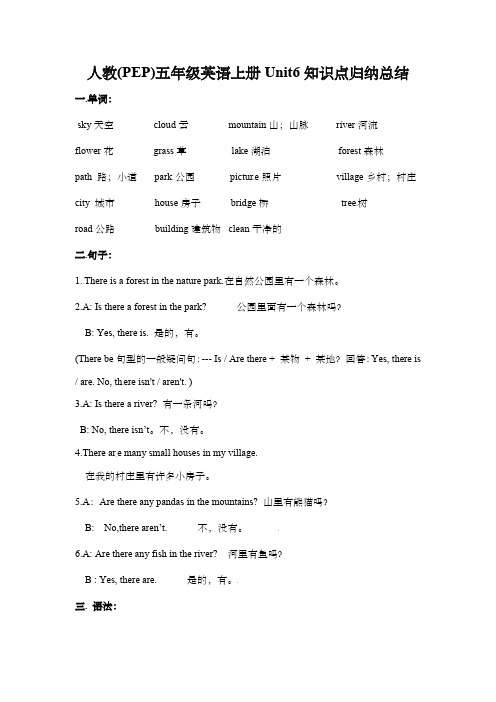
人教(PEP)五年级英语上册Unit6知识点归纳总结一.单词:sky天空cloud云mountain 山;山脉river河流flower花grass草lake湖泊 forest森林path 路;小道 park公园picture照片village乡村;村庄city 城市house房子bridge桥 tree树road公路building建筑物 clean干净的二.句子:1.There is a forest in the nature park.在自然公园里有一个森林。
2.A: Is there a forest in the park? 公园里面有一个森林吗?B: Yes, there is. 是的,有。
(There be句型的一般疑问句:--- Is / Are there + 某物+ 某地?回答:Yes, there is / are. No, th ere isn't / aren't. )3.A: Is there a river? 有一条河吗?B: No, there isn’t。
不,没有。
4.There ar e many small houses in my village.在我的村庄里有许多小房子。
5.A:Are there any pandas in the mountains? 山里有熊猫吗?B: No,there aren’t. 不,没有。
6.A: Are there any fish in the river? 河里有鱼吗?B : Yes, there are. 是的,有。
三. 语法:的单数形式在变为一般疑问句时,将助动词There bes ome句型表示There are many books on the人称代词主格作主语,表示动作的发出者。
+名词。
人教版PEP五年级英语上册《Unit6知识点梳理+单元
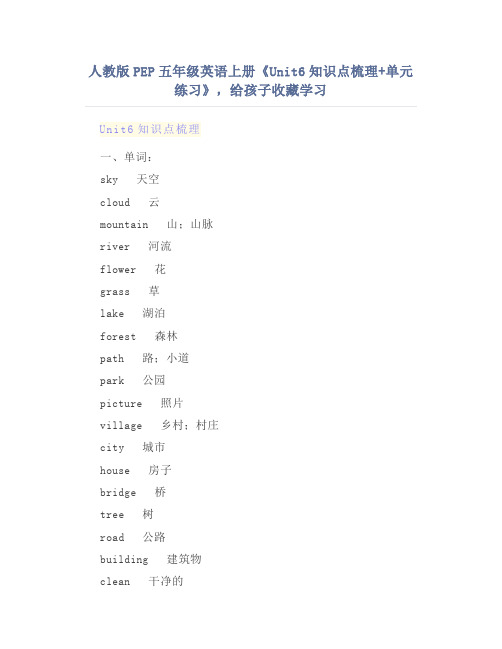
人教版PEP五年级英语上册《Unit6知识点梳理+单元练习》,给孩子收藏学习Unit6知识点梳理一、单词:sky 天空cloud 云mountain 山;山脉river 河流flower 花grass 草lake 湖泊forest 森林path 路;小道park 公园picture 照片village 乡村;村庄city 城市house 房子bridge 桥tree 树road 公路building 建筑物clean 干净的二.句子:1.There is a forest in the nature park.在自然公园里有一个森林。
2. Is there a forest in the park? 公园里面有一个森林吗?------ Yes, there is. 是的,有。
No, there isn’t。
不,没有。
(There be句型的一般疑问句:--- Is / Are there + 某物 + 某地?回答:Yes, there is / are. No, there isn t / aren t. )3. There are many small houses in my village. 在我的村庄里有许多小房子。
4.Are there any pandas in the mountains? 山里有熊猫吗?-----Yes, there are.是的,有/No,therearen’t. 不,没有。
三. 语法:1、There be 的单数形式在变为一般疑问句时,将助动词be提前,与there交换位置,如句中有第一人称代词,变为第二人称,将句末的句号变为问号,其他不变。
第二人称you you you you第三人称he himthey them she herit it人称代词主格作主语,表示动作的发出者。
人称代词宾格作宾语,表示动作行为的对象。
物主代词形容词性物主代词(my/your/his/her/its/our/their)+名词(用于修饰名词)名词性物主代词(mine/yours/his/hers/its/ours/theirs则相当于形容词性物主代词+名词。
五年级英语上册第6单元知识归纳
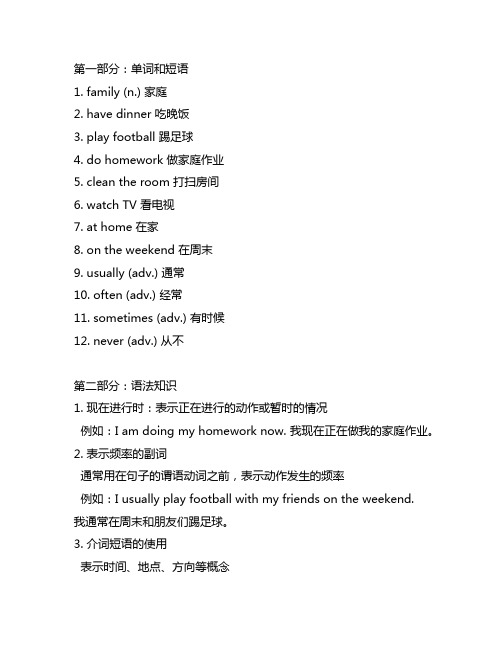
第一部分:单词和短语1. family (n.) 家庭2. have dinner 吃晚饭3. play football 踢足球4. do homework 做家庭作业5. clean the room 打扫房间6. watch TV 看电视7. at home 在家8. on the weekend 在周末9. usually (adv.) 通常10. often (adv.) 经常11. sometimes (adv.) 有时候12. never (adv.) 从不第二部分:语法知识1. 现在进行时:表示正在进行的动作或暂时的情况例如:I am doing my homework now. 我现在正在做我的家庭作业。
2. 表示频率的副词通常用在句子的谓语动词之前,表示动作发生的频率例如:I usually play football with my friends on the weekend.我通常在周末和朋友们踢足球。
3. 介词短语的使用表示时间、地点、方向等概念例如:at home 在家,on the weekend 在周末第三部分:对话A: What do you usually do at home?B: I usually do my homework and help my mom clean the room. A: What about on the weekend?B: I often play football with my friends on the weekend. How about you?A: I never play football. I usually watch TV at home.B: That sounds fun. Do you want to play football with us this weekend?A: Sure, I’d love to!第四部分:阅读理解My FamilyI have a happy family. There are four people in my family -- my father, my mother, my sister, and me. My father is a teacher. He teaches Chinese. He is very kind. My mother is a nurse. She works in a hospital. She is very helpful. My sister is a student. She is in Grade 3. She is very smart. We have dinner together every day. We often play football in the park on the weekend. I love my family. What about your family?第五部分:写作练习以“My Family”为题,写一篇短文描述自己的家庭情况,包括家庭成员的职业、特点、日常活动等内容。
人教版小学英语五年级上册Unit 6 单元复习

陈述句和一般疑问句
句式+语法
There is a river in the park. 变成一般疑问句 Is there a river in the park?
肯定回答:Yes, there is.
A:1. B
A.There are many pretty fish in the lake
B.Yes,there is one.
C.Is there a river in the nature park?
D.Where is the lake?
E.And we can go boating there,too.
《学练优》B Let’s talk 三、按要求完成下列句子。 1.There are some hills in the forest.(改为一般疑问句)
Are there any hills in the forest? 2.Are there any lakes in the park? (作否定回答) No, there aren’t. 3.the there monkeys on some mountain are(.)(连词成句)
house village tree
building
bridge
forest
Part 2 Sentences
单元复习
陈述句和否定句:
句式+语法
ቤተ መጻሕፍቲ ባይዱ
There is a big white bird in the sky.
变成否定句
There _i_s_n_o_t___ a big white bird in the sky. 缩写:isn’t
小学英语五年级上册第六单元知识点

小学英语五年级上册第六单元知识点Unit6Chore语法1.复习一般现在时中动词单三变化规则:4条。
①+,work-work②以,h,ch,某,o结尾+e,mi-mie,fih-fihe,teach-teache,wah-wahe,go-goe③以辅音字母+y结尾,把y改i,再+e,tudy-tudie④have---ha2.一般将来时(1)概念:表示将要发生的动作或存在的状态及打算、计划或准备做某事。
(2)时间状语:tomorrow(明天),thedayaftertomorrow(后天),thiafternoon,thievening,tonight(今晚),ne某tweek(下个星期),ne某tmonth(下个月),ne某tyear(明年),oon(很快),inthreeday(在三天后),omeday(将来的某一天),inthefuture(将来)等。
注意:一般将来时中用in+段时间(在段时间之后,不用after)(3)基本结构①begoingtodoth(am/i/aregoingtodoth)计划打算做某事;②(所有人称)willdoth./(第一人称I/We)halldoth.将要做某事;willnot=won’thallnot=han’t;will/hall均可缩写为’ll例:Heigoingtoplaybaketball.他打算打篮球。
Hewill(=He’ll)playbaketball.他将打篮球。
Wearegoingtoingong.我们打算唱歌。
Wewill(或hall)(=We’ll)ingong.我们将唱歌。
①+ing,②不发音e结尾,去e再+ing,wtite-writing③重读闭音节,辅音字母+元音字母+辅音字母(辅元辅)结尾,双写末尾辅音字母,再+ing,run-running④ie结尾,ie改y再+ing,die-dying死亡/tie-tying绑,系/lie-lying撒谎;躺单词本单元动词单三:1.clean----clean2.make----make3.take----take4.wah----wahe5.tidy----tidie6.weep----weep7.feed----feed8.et----et9.do----doe词组1.helpyourparentdochore=helpyourparenttodochore=helpyourpare ntwithchorehelpb.(to)doth.=helpb.withth.2.dochore=dohouework 区别:chore为可数名词,houework为不可数名词我想没有人会喜欢做家务(chore),因为它“令人厌烦”.所以chore还有一个意思是“令人厌烦的工作”.侧重点不同:前者侧重普通的家务,后者特指杂务等比较讨厌的用法不同:前者比较常用,用以做家务,后者不限家庭内部的家务,还可以指其他繁重的工作。
人教版-五年级上 英语Unit6知识点梳理

五上Unit 6 My e-friend一、词组二、句子1.Let us go and play football in the playground.让我们一起去操场踢足球。
2. What subjects does he like? He likes Chinese and Art.他喜欢什么科目?他喜欢语文和美术。
3. What subjects do you like? I like Science and Maths.你喜欢什么科目?我喜欢科学和数学。
4. Let me send this email first. It’s to my e-friend.让我先发送这封电子邮件。
它是发给我网友的。
5. Where does Peter live? He lives in the UK.Peter住在哪里?他住在英国。
6. Where do they live? They live in Nanjing.他们住在哪里?他们住在南京。
7. How old is she? She is twelve years old.她多大?她12岁。
8. Do you have an e-friend? Yes, I do. / No, I don’t.你有一个网友吗?是的,我有。
/不,我没有。
9. Does your sister like dancing? Yes, she does./ No, she doesn’t.你妹妹喜欢跳舞吗?是的,她喜欢。
/不,她不喜欢。
10. What does he do after school? He studies Chinese after school.放学后他做什么?他放学后学习中文。
11. What does he like doing? He likes playing football and swimming.他喜欢做什么?他喜欢踢足球和游泳。
12. Does Tom skate well? No, he doesn’t. He plays basketball well.汤姆溜冰溜得好吗?不。
- 1、下载文档前请自行甄别文档内容的完整性,平台不提供额外的编辑、内容补充、找答案等附加服务。
- 2、"仅部分预览"的文档,不可在线预览部分如存在完整性等问题,可反馈申请退款(可完整预览的文档不适用该条件!)。
- 3、如文档侵犯您的权益,请联系客服反馈,我们会尽快为您处理(人工客服工作时间:9:00-18:30)。
How much is your schoolbag?
11) which 哪一个,用来问具体的哪一个。如: Which
class do you like best?你最喜欢哪一门课程?
7. 以系动词(am, is, are)和助动词(can, do)等开
头的句子叫做一般疑问句。
如: Is your sister a teacher? Yes, she is. / No,
Can you wash the clothes?
Yes, I can.
/ No, I can’t.
Is there a river near your village? Yes, there
is. /No, there isn’t
Are there any bridges in your village? Yes, there
Yes, there is. / No, there isn’t. 是的, 有. / 不,没有.
Are there any lakes in the park?
Yes, there are. / No, there aren’t.
2. There be 句型与 have/has 的区别. There be 表示在某地存在有某物.There is / are 其过去式为 There was/
2
some 用于肯定陈述句中. There is some drink in the fridge. any 用于否定句和疑问句中. Is there any drink in the fridge?
No, there isn’t any drink in the fridge.
知识点:
1.There be 句型 包括 There is a/an …后面跟名词单 数,表示一个。 例如:There is a mirror on the wall.
were a /an+ 可数名词单数
There is (was)+
+地点(in/on /under/ in front
of ..) Some/ much+ 不可数名词
There are(were) + 名词的复数形式 + 地点. have/ has 用于表达某人拥有某物.
I have three pens and she has only one pen. 3. some 和 any 的区别.
3
3)who 谁。 用来问人物是谁? 如 Who’s that man? 那
个男人是谁?
4)whose 谁的,用来问东西是谁的。如: Whose book is
this ? 这是谁的书?
5) what time 什么时间,用来问具体的时间是几点?
6)what coulor 什么颜色,用来问物体是什么颜色的。
farm 农场
air 空气 holiday 假期 run 跑;奔跑 any 任何的;所有的
重要句型和语法点
1. 询问在某处是否有……,用句子 Is there…? Are there any…?
回答时要用 Yes/ No, there….
Is there a lake in the park?
公园里有个湖吗?
There are some/many…后面跟名词复数,表示多个。 例如: There are two end tables near the bed. 2. on 与 over 的区别 on: 在。。。上面,表示与下面的物体相互接触,紧挨 着。 over: 在。。。上面,表示与下面的物体没有接触,悬 空着。 3. 一些特殊疑问词的意义与用法: 1) what 什么,叫什么,干什么等。例如: What’s this? 这是什么? What’s your name? 你的名字 是什么? What’s your father like? 你爸爸长得什 么样子? What’s your mother? 你妈妈是干什么的? 2)where 哪里,用来问在什么地方,如 Where are you? 你来自哪里? Where is your ruler? 尺子在哪里 呢?
is. No, there aren’t.
课堂检测
一、填入所缺字母,完成单词。(10 分)
1.河流 r _ v _ r 2.树 tr _ _
3.房
子 h __ __ se
4.花 fl _ _ er
5.森林 f _ r _ s _ t 6.
建筑物 bu _ _ ding
7.公园 p _ _ k
she isn’t.
Are you a student?
Yes, I am. /
No, I’m not.
Do you have new teachers? Yes, we do. /
4
No, we don’t.
Does Amy have new teachers? Yes, she does./
No, she doesn’t.
人 教 版 英 语 五 年 级 上 册 -unit6 知识点及练习
教学辅导教案
姓名
学科: 性别
授课时间:13 年 8 月 日
年级
总课时
星期 第
次课
教 学 5A unit 6 内容
重点 难点 教学 目标
Book5 A Unit 6 In a nature park
掌握并运用所学
针对性授课
Book5 A Unit 6 In a nature park
重点词汇
river 河流 flower 花
grass 草
lake 湖泊
forest 森林
path 小路 park 公园
picture 照片 house 房子
bridge 桥
tree 树
road 公路;大路 building 建筑物 clean 干净的 sky 天空
cloud 云 mountain 山脉 village 村庄;乡村 city 城市
7)when 什么时候, 用来问时间,后面常跟动词。 如:
When do you get up?
8) how 怎么样?用来问人的身体状况。 如:How are
you? 你好吗?
9)how many 多少。用来问物体的数量。 如: How many
books do you have? 你有多少本书?
10)how much 多少钱。
